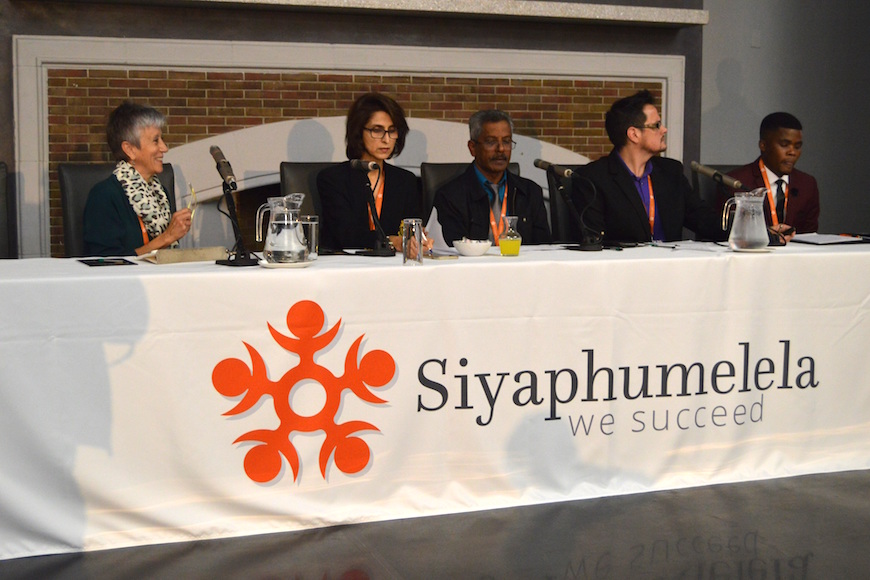The Siyaphumelela Conference was held at the Wanderers Club in Johannesburg from the 25 to 27 June 2019. The conference provides an important platform for experts from the international community as well as key South African players in the field of higher education to engage in conversations and share experiences on students and their learning experience universities.
The overall aim of the Siyaphumelela project is to have South African universities employ evidence-based practices—informed by robust analysis of student data at each institution and by sharing approaches across the participating institutions— to yield more graduates from all racial, gender, and socio-economic groups. To achieve better graduation rates for all students, the Siyaphumelela universities such as the Durban University of Technology (DUT) will achieve three institution-level outcomes.
They are the knowledge of approaches, which includes appropriate high impact practices, that optimise student success in the South African context (knowing); a sustained capacity to implement, manage, and act on data analysis (doing); and a positive culture of evidence-based inquiry and analysis geared towards student success (being).
DUT was well represented at the conference with a panel discussion on Building Institutional Capacity towards a data informed culture for student success. The panel discussion was made up of Sean Carte (Data Working Group Member, DUT Library Directorate), Nicky Muller (Director DUT Institutional Planning), Rajan Naicker (Director DUT Department of Management Information), Koo Parker (Siyaphumelela Institutional Researcher DUT Institutional Planning), Ashton Maherry (Siyaphumelela Data and Training Officer DUT Institutional Planning), and Sibusiso Zuma (Student Representative Council (SRC 2018/19) Midlands Campus).
Discussions pertained to the lessons learned in the four objectives of the Bonus Grant, namely improving access to and usability of data, improving capacity to use data, data infrastructure and AutoScholar – DUT’s Student Tracking application.
Formal presentations were made by Sbonsio Ngcobo, DUT BTech Food Sciences student who presented on an exploration of food security amongst students in a University of Technology: A holistic intervention approach. Livingstone Makondo, Cebo Luthuli, Mzwandile Khumalo, Xolile Xaba, Peter Kalanga and Simon Ndlovu from the Centre for Excellence in Learning and Teaching, spoke on engaging the student voices: Putting students at the centre of First Year Experience Design.
Rosaline Govender and Xolile Xaba from Faculty of Accounting and Informatics, delved on Student’s voices: First Year Student Experience and student success.
Mzwandile Khumalo and Cebokazi Luthuli from Centre for Excellence in Learning and Teaching tackled the First year student experience as a supplementary tool for disciplinary knowledge. Koo Parker from the Institutional Planning spoke on Reality bites – Do first year student’s expectations about university go unmet?
Ashton Maherry, Patience Mustvairigwa and Gilbert Chinyani – Institutional Planning and the Centre for General Education, focused on Student survey fatigue or student survey frustration. Simon Ndlovu from the Centre for Excellence in Learning and Teaching also presented on Technology for learning programmes: Impacting the lives of Durban University of Technology students with the use of education technologies.
Additional presentations and feedback were done by Professor Theo Andrew, Acting DVC Research and Learning and Sibusisio Zuma, Student Representative Council (SRC 2018/19) Midlands Campus.
Reflecting his thought on the conference, Zuma added that the presentations from the conference showed that the universities are really trying hard to ensure that we succeed as students. “It is also very important for us as students to also buy in and contribute to our success. It is high time that ‘we walk the talk’, we have always been saying ‘there is nothing for us without us’. But how do we expect to achieve any of that if we don’t actually take part and contribute to the change we want to see,” he stressed.
He also said that the need for universities and Higher Education Institutions in general must understand that students use these as place of hope to a better tomorrow. “It is important for these institutions to understand this and align correctly with the understanding that we are there with an attitude that says ‘we believe that our next is definitely always going to be better than our now’,” he said.
Some of the DUT delegates also met with Dr Karen Stout, CEO of Achieving the Dream, to consider how DUT could pilot the Holistic Student Support design for South African universities. This is an exciting opportunity for DUT to reconceptualise its systems and processes towards supporting our students.
DUT’s Data Day on the 28 to 29 August 2019 will further showcase how DUT is using data to drive organisational effectiveness, and ultimately student success. Further information can be found on www.dut.ac.za/dut-data-day.
Pictured: Nicky Muller, Koo Parker, Rajan Naicker, Ashton Maherry and Sibusiso Zuma at the panel discussion on Building Institutional Capacity towards a data informed culture for student success.
Ashton Maherry


